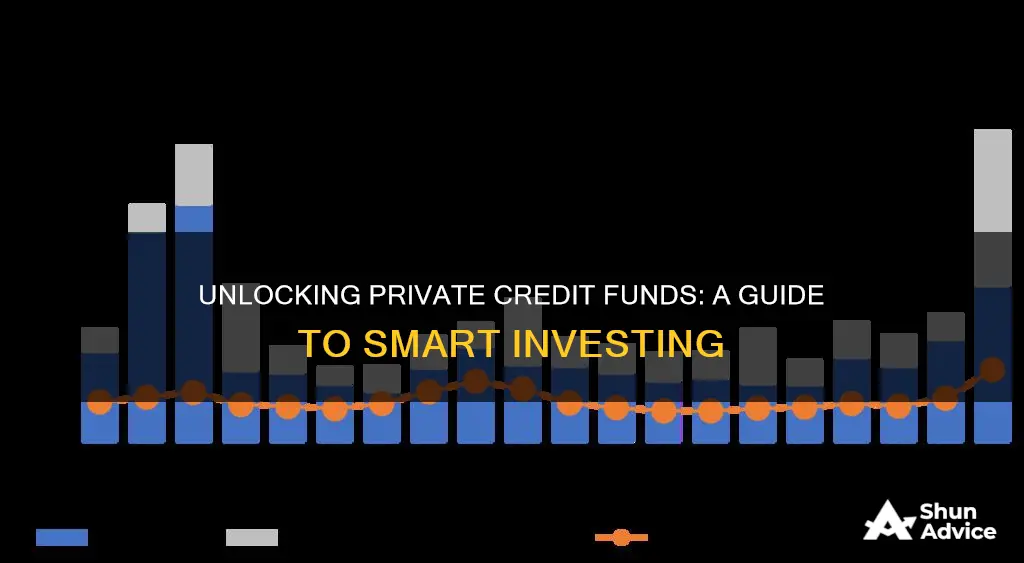
Private credit funds are a type of fixed-income investment that allows investors to buy into off-market loans that would otherwise be inaccessible. These funds are typically originated by non-bank financial institutions, such as private equity shops or alternative asset managers, and then stakes in the fund are sold to partner investors. Private credit funds invest in the debt of small- and medium-sized companies, which may be considered higher risk and therefore less attractive to traditional banks. This type of investment offers potentially higher returns, diversification, and access to off-market opportunities, but it also comes with a lack of liquidity, hefty fees, and greater investment risk. To invest in private credit funds, individuals typically need to be accredited investors, institutional investors, or investment professionals, and they must be prepared to lock in their money for lengthy periods, often ranging from five to ten years.
| Characteristics | Values |
|---|---|
| Definition | A contract, often a loan, that a borrower repays with interest to a lender |
| Type of Lender | Non-bank lender |
| Borrower | Private companies, typically small and medium-sized enterprises that are non-investment grade |
| Interest Rate | Floating rate |
| Investor Type | Accredited individual investors, institutional investors or investment professionals |
| Investor Requirements | Net worth of more than $1 million, income of $200,000 or more over the last two years, or $300,000 or more as a couple |
| Investor Risks | Lack of liquidity, hefty fees, greater investment risk, higher minimum investments |
| Investor Benefits | Potentially higher total return, diversification, access to off-market investments |
What You'll Learn

Private credit vs. private equity
Private credit and private equity are alternative investment options that are not publicly available. They are quite similar in many ways, but there are also some key differences.
Private credit is a fixed-income investment where accredited investors and institutional investors can buy the off-market debt of private companies. These are often small and medium-sized companies that are riskier to lend to and, therefore, less attractive to banks. Because of the higher risk, investors can expect higher interest rates than they would get from investment-grade debt. Private credit funds are originated by non-bank financial institutions, such as private equity shops or alternative asset managers, which then sell stakes in the fund to partner investors.
Private equity, on the other hand, involves taking an ownership stake in a company that is not traded on the public markets. Investors are required to make a long-term commitment with their capital. In exchange for this illiquidity, private equity investors seek elevated returns.
Who can invest?
Both private credit and private equity are generally only available to institutional investors and accredited investors. To be an accredited investor as an individual, you and/or your spouse must have a net worth of over $1 million, excluding your main residence. You must also have an individual income of $200,000 or more over the last two years, or a joint income of $300,000 or more.
Private credit offers more predictable and stable returns than private equity. As private credit investors are acting as creditors, they are more likely to be repaid if the borrower faces bankruptcy. The returns are established by the terms of the loan and are relatively stable unless the borrower defaults.
Private equity investors could earn huge profits if the company they invest in is sold or brought to the public market. However, they could also lose their entire investment if the company is unsuccessful. As shareholders, private equity investors would be among the last to be compensated in the event of bankruptcy.
Private credit plays an important role in the financial system by providing loans to businesses that may not be able to secure them through banks or public debt markets. It offers investors the potential for higher returns than bonds and other fixed-income assets.
Private equity investors benefit from the possibility of huge returns and increased control over management decisions. They can also benefit from the expertise of the private equity firm.
Private credit and private equity are both alternative assets that could be attractive to investors looking for different benefits for their portfolios. Private credit may be more suitable for investors seeking stable and predictable returns, while private equity could be a better option for those in search of high potential returns. However, it is important to note that with higher potential returns comes elevated risk.
UK Pension Funds: Where Is Your Money Invested?
You may want to see also

Who can invest in private credit funds
Private credit funds are not accessible to everyone. To be able to invest in private credit, you must be an accredited individual investor, institutional investor, or investment professional.
To be an accredited investor as an individual, you and/or your spouse must have a net worth of over $1 million, excluding your main residence. You must also have an income of $200,000 or more over the last two years, or $300,000 or more combined with your spouse.
Other accredited investors include professionals with a Series 7, Series 65, or Series 82 certification, SEC-registered investment advisors and broker-dealers, financial firms such as banks and investment companies, entities with investments over $5 million, and knowledgeable employees of a private fund.
Some investors may work with a financial advisor to gain access to private credit funds, although other more accessible options may be available. For example, some Business Development Companies (BDCs) are publicly traded, meaning anyone can invest in the public market. BDCs are, however, known for their high dividends and high risk.
There are also other investing platforms that may give you access to private credit with small to mid-size minimum investments. These include Percent, Yieldstreet, and Fundrise.
Invest Wisely: Franklin India Low Duration Fund Guide
You may want to see also

Pros and cons of private credit funds
Private credit investment has become an increasingly popular option in recent years. It involves lending money to businesses or individuals who may not qualify for traditional bank financing. Here are some of the pros and cons of investing in private credit funds:
Pros:
- High returns: Private credit investments typically offer higher interest rates than traditional bank loans, leading to potentially higher returns for investors.
- Flexibility: Investors can diversify their portfolios by choosing from a wide range of projects with different terms, thus reducing their overall risk.
- Consistent income: Regular interest payments from borrowers provide a stable and consistent income stream for investors.
- Low correlation with public markets: Private credit investments tend to have a low correlation with public markets, offering diversification benefits and reduced volatility for investment portfolios.
- Priority in repayment: In the case of bankruptcy, private credit investors, as creditors, have priority over shareholders in the repayment hierarchy.
Cons:
- Illiquidity: Private credit investments often require investors to lock in their money for extended periods, making it challenging to access funds when needed.
- Increased risk: The potential for higher returns comes with higher risk. Borrowers may default, especially during economic downturns or unforeseen events, impacting their ability to repay loans.
- Lack of transparency and regulatory protection: Private credit investments may not provide the same level of transparency and regulatory protection as traditional investments, making it challenging to fully understand the associated risks.
- Stringent accreditation requirements: Private credit funds often have strict accreditation standards and high minimum investment requirements, limiting access to institutional investors and accredited investors.
- High fees: Private credit funds may charge significant fees, including acquisition and management fees, which can eat into the overall returns.
A Global Investor's Guide: Foreign Index Funds
You may want to see also

How to invest in private credit funds
Private credit is a kind of fixed-income investment that allows investors to purchase the off-market debt of private companies. Private credit funds are originated by non-bank financial institutions, such as private equity shops or alternative asset managers. These institutions then sell stakes in the fund to partner investors.
Private credit funds invest in the debt of small and medium-sized companies, which may be higher risk and, therefore, less attractive to a typical bank. Because this debt is higher risk, it pays higher rates than the investment-grade debt of high-quality borrowers. The potentially higher return is the main appeal for investors, especially if they can find strong returns for relatively less risk.
Who can invest in private credit?
Private credit is not immediately accessible to everyone, and investors must usually be accredited individual investors, institutional investors, or investment professionals. To be an accredited investor, an individual and/or their spouse must have a net worth of more than $1 million, excluding their main residence. An individual must also have an income of $200,000 or more over the last two years, or a couple must have earned $300,000 or more.
How to invest in private credit
Investors who are interested in accessing private credit have a few options, starting with private equity funds and moving to more available options.
Private equity
These asset managers can source deals and package them into funds for investors, who then buy into them. Generally, it will take significant money to get started on this route. It is recommended to work with an investment advisor to help gain access and vet the most attractive candidates.
Business development companies (BDCs)
Some BDCs are publicly traded, allowing access to anyone who can invest in the public market. BDCs are known for their high dividends and high risk, and you will need to investigate each company's portfolio to see if it is investing in debt securities that you may be interested in. If you invest indirectly through a publicly traded BDC, you can get started for the cost of just one share.
Other investing platforms
Other broadly available investing platforms may also give you access to private credit and may do so with small-to-mid-size minimum investments. Platforms such as Yieldstreet, Percent, and Fundrise can help investors get started in private credit with lower amounts of money.
Risks and considerations
Private credit may offer investors the potential for better overall returns, even when factoring in the extra risk of investing in small companies. But investors looking into this off-market area must be fully attuned to the potential risks, especially when the economy weakens, as small companies are likely to have less solid financial stability than more established firms.
Private credit firms often require investors to meet strict accreditation standards and start with a high minimum investment. Private credit firms also make loans for extended terms, requiring investors to commit their capital over long time frames.
A Guide to Investing in CPSE Exchange Traded Funds
You may want to see also

Private credit funds and regulatory changes
The private credit market has grown rapidly in recent years, with the migration of lending from regulated banks to the more opaque world of private credit, creating potential risks that regulators and supervisors are becoming increasingly concerned about.
Limited Oversight and Accountability
The private credit market operates with minimal direct regulatory oversight. The lack of transparency in this market obscures its true size and risk. There is insufficient insight into loan terms, lenders' funding structures, and borrowers' financial health. This lack of transparency and clear interconnections between private credit funds, private equity firms, commercial banks, and investors make it challenging to assess potential systemic vulnerabilities.
Interconnectedness and Systemic Risk
The private credit market is highly interconnected, with significant links to the banking system. Banks have engaged in lending to private credit funds, partnered with funds to arrange private credit deals, and transferred risk through exotic financial instruments. While banks do not seem to have material exposure to private credit in aggregate, some banks may have concentrated exposures to the sector. A select group of pension funds and insurers are also diving deeper into private credit, upping their share of these less liquid assets.
Liquidity Risk
Private credit funds use long-term capital lockups and constraints on investor redemptions, but new funds targeted at individual investors may have higher redemption risks. Although these risks are mitigated by liquidity management tools, they have not been tested in a severe runoff scenario. Liquidity risks appear limited today, but a growing retail presence may alter this assessment.
Credit Quality and Valuation
Companies that tap into the private credit market tend to be smaller and carry more debt, making them more vulnerable to rising rates and economic downturns. With the recent rise in benchmark interest rates, more than one-third of borrowers now have interest costs exceeding their earnings. Private market loans rarely trade and are often valued using risk models, which may result in stale and subjective valuations across funds.
Regulatory and Supervisory Approach
Authorities are urged to adopt a more vigilant regulatory and supervisory posture to monitor and assess risks in this market. This includes focusing on monitoring and risk management, leverage, interconnectedness, and concentration of exposures. Enhancing cooperation across industries and borders is also crucial to address data gaps and improve risk assessments across financial sectors. Regulators should also improve reporting standards and data collection to better monitor the growth of private credit and its implications for financial stability.
Investing in ICICI Prudential Bluechip Fund: A Comprehensive Guide
You may want to see also
Frequently asked questions
Private credit is a kind of fixed-income investment that allows investors to purchase the off-market debt of private companies. Private credit funds are originated by non-bank financial institutions, such as private equity shops or alternative asset managers.
Private credit is not easily accessible to everyone. Investors must usually be accredited individual investors, institutional investors or investment professionals. To be an accredited investor, an individual or their spouse must have a net worth of more than $1 million, excluding their main residence.
Private credit can offer potentially higher total returns and access to off-market investments. It can also add diversification to a portfolio and potentially reduce its risk. However, there are hefty fees, a lack of liquidity, greater investment risk and higher minimum investments involved.
Investors can access private credit through private equity funds, business development companies (BDCs) and other investing platforms. Private equity funds source deals and package them into funds for investors to buy into. BDCs are known for their high dividends and high risk, and some are publicly traded. Other investing platforms may offer access to private credit with smaller minimum investments.







